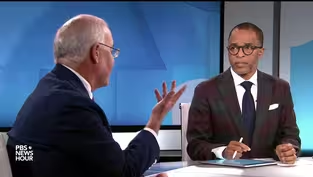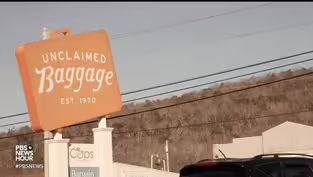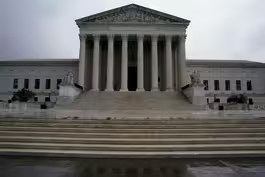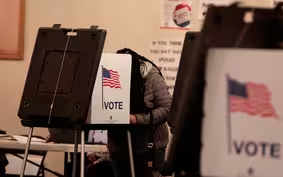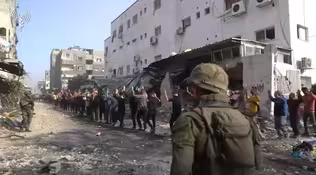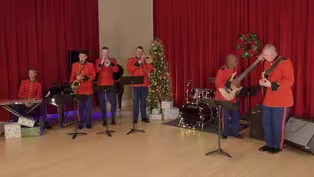
Palestinian poet Mosab Abu Toha on hopes for his homeland
Clip: 12/22/2023 | 7m 46sVideo has Closed Captions
Palestinian poet Mosab Abu Toha on all he's lost in Gaza and hopes for his homeland
Award-winning Palestinian poet Mosab Abu Toha has lost his home, friends and family in the last two months. He was also detained by Israeli forces in Gaza and released only after international outrage. He's now out of Gaza and in Cairo with his wife and kids. He joined Amna Nawaz to reflect on all that he's lost and his hopes for his homeland.
Problems playing video? | Closed Captioning Feedback
Problems playing video? | Closed Captioning Feedback
Major corporate funding for the PBS News Hour is provided by BDO, BNSF, Consumer Cellular, American Cruise Lines, and Raymond James. Funding for the PBS NewsHour Weekend is provided by...

Palestinian poet Mosab Abu Toha on hopes for his homeland
Clip: 12/22/2023 | 7m 46sVideo has Closed Captions
Award-winning Palestinian poet Mosab Abu Toha has lost his home, friends and family in the last two months. He was also detained by Israeli forces in Gaza and released only after international outrage. He's now out of Gaza and in Cairo with his wife and kids. He joined Amna Nawaz to reflect on all that he's lost and his hopes for his homeland.
Problems playing video? | Closed Captioning Feedback
How to Watch PBS News Hour
PBS News Hour is available to stream on pbs.org and the free PBS App, available on iPhone, Apple TV, Android TV, Android smartphones, Amazon Fire TV, Amazon Fire Tablet, Roku, Samsung Smart TV, and Vizio.
Providing Support for PBS.org
Learn Moreabout PBS online sponsorshipsome of his friends and family# members in the last two months.
On November 19, he himself was detained# by Israeli forces on his way to the Ra border as he tried to evacuate Gaza with# his family, and was released only after## international outrage.
He's now in Cairo# with his wife and three kids and joined## me earlier to talk about what he left behind# and what the future holds for his homeland.
Mosab, welcome to the "NewsHour."
Thank you so much for joining MO SAB ABU TOHA, Award-Winning AMNA NAWAZ: Take us back, if so you and your family were trying to# evacuate, headed down to the Rafah border.## You were stopped by Israeli forces.
What did# they tell you about why you were detained?
MOSAB ABU TOHA: Well, I was# taking the Salah al-Din Street,## the street that should have been safe# passage fo the northern part of Gaza to the# southern part of the Gaza Strip.
And on the way, there was a line,# and there's Israeli soldiers.
There## was an Israeli soldier calling people by# description.
So when it came to me, "The young man with a black pack -- backpack# and with a red-haired boy, put the boy down and## drop all your things and come join the line.# There were about six snipers aiming at me."
So I put the boy down, I dropped everything, and# then I joined the line of the people.
And then I## was undressed in front of a jeep behind a# wall.
Everything was confiscated from me,## including my -- all of the passports.
And# then I was blindfolded and handcuffed.
Later,## I knew that I was taken to Be'er# Sheva about two hours away from Gaza,## and without knowing anything, without having# the blindfold or the handcuffs removed.
So, we spent -- I spent personally# about 50 hours without seeing anything,## without being able to remove -- to move my hands.
AMNA NAWAZ: Mosab, you were taken, we know,# to a detention center as you say.
You were kept there for two days.
What was that treatment like?
And, at any# point, did anyone say wh MOSAB ABU TOHA: Well, they first accused me of# being a Hamas activist.
I was beaten very hard.
I was slapped across the face.
I# asked them if they have any proof.## And he slapped me across the face.
He said:# "You give me proof that you are Th en they didn't have any evidence.
I# asked them if they have a photograph,## a video, a satellite, anything that shows# that that's what they are saying is correct.
But it turned out to be that they were# just taking me.
And they knew who I was,## because my son was -- is an American# citizen, and we are his family.
So the## names that were listed on the Rafah# Border Crossing were cleared by the## Israelis.
They were just taking me to# just treat me as bad as they could.
AMNA NAWAZ: Mosab, were you# alone during this whole time?
MOSAB ABU TOHA: No.
et cetera, there were about at# least 70 to 100 people.
And then,## when we were taken to Be'er Sheva, in that# detention center, there were about 116 people.
And then, the next day, on Monday, I mean,# I heard that there were new people.
And the## soldiers next door were making fun of the# detainees.
They were asking them to repeat## Arabic children's songs.
My wife told me that# she used my phone, which she kept with her.
She used my phone to contact# my friends, friends from CNN,## friends from "The New Yorker," The# Washington Post, The New York Times.## Every one of them wrote about my kidnap,# and they asked for my safe release.
And## I would like here to thank everyone who# helped me get out as soon as possible.
And I ask everyone in the world to# work very hard to get everyone out.
AMNA NAWAZ: Mosab, we are speaking today# as the home you left behind is virtually## unrecognizable.
And it's now at the grim# milestone of over 20,000 people killed.
What is it like for you to hear that number?
MOSAB ABU TOHA: I can't believe what# I see.
I can't believe what So I'm now here in Cairo, unable to# do anything to protect m the fact that I was unable to do anything# while I was in Gaza, and now I'm also again## helpless to do anything to help and support# my family in Gaza, is very, very devastating.
It's really very hard.
With each# step I took outside of Gaza,## I knew that I was kilometers# away from my family in Gaza.
AMNA NAWAZ: I know you have lost dear# friends and neighbors in this war so## far.
You posted a video of you reading# part of a poem by one of those friends,## a man named Refaat Alareer, a# very famous poet and essayist.
The poem is called: "If I Must Die."
Here's# a clip of you reading part of that poe MOSAB ABU TOHA: "If I must die,# you must live to tell my story,## to sell my things.
If I must die,# let it bring hope.
Let it be a tale."
AMNA NAWAZ: So, Mosab, Gaza's# storytellers are among those## who are dying, poets and essayists# and photographers and What's the impact of that?
MOSAB ABU TOHA: Well, the impact tha neither they are Gazans or# international journalists.
They want to kill people in Gaza, and# they don't want the people to de what happened.
So they want just to bury# the story and bury the people with it,## which is, I think, the worst crime# that could happen in history.
AMNA NAWAZ: As you know, Israeli# officials, and I have to say,## Israelis I have spoken with say they cannot# ha ving lived through those October 7 Hamas# attacks, and they want to see Hamas gone.
How does this end?
What do you see ahead?
MOSAB ABU TOHA: I think they# can be true about sa but I would like to say to them and to the whole# I mean, in Gaza, in the West Bank, Palestinians# in the diaspora, they have been unable to live## at all.
We need to live a decent life, just like# the one they are trying to have after killing us.
AMNA NAWAZ: I know, when you left,# you were fleeing with really just## what you could carry.
And I wonder# what it is you bro MOSAB ABU TOHA: Well, I brought my wife with me,## my three children, and a# co one -- only one copy.
I lost every book that# I was trying t Every time I traveled to the United States --# I went there three times.
Every time I went,## I went -- I came back to Gaza# with dozens of English books,## especially ones signed by friends, author# friends.
But now, when I got out of Gaza,## I only had one copy of my book, which I --# which was published last year in San Francisco.
And I only got out only with my clothes.
AMNA NAWAZ: You're in Cairo now.
What's next# for you and your family?
Whe MOSAB ABU TOHA: Well, I have three# options.
One is going to the United## States, which is something that# I'm not willing to do right now, because my family and also my wife's# family are still in mort Any moment, we can hear about something bad# from them, just like I learned today about## the death of, like, a very close friend of mine# who used to be a farmer and a very excellent## soccer player.
The second option is being here in# Cairo for a job opportunity.
And the third one,## which I hope will happen soon, is returning# to Gaza and reuniting with my family.
And, hopefully, we are not# going to miss any one of them.
AMNA NAWAZ: Mosab Abu Toha,# joining us tonight from Cairo.
Mosab, thank you so much for your time.
We're## thinking about you and your# fa MOSAB ABU TOHA: Thank you so much for having me.
Brooks and Capehart on the overwhelmed immigration system
Video has Closed Captions
Clip: 12/22/2023 | 11m 14s | Brooks and Capehart on the political pressure of the overwhelmed immigration system (11m 14s)
Critics recommend their must-see movies of 2023
Video has Closed Captions
Clip: 12/22/2023 | 8m 17s | Critics recommend their must-see movies of 2023 (8m 17s)
Inside the store that sells lost and unclaimed baggage
Video has Closed Captions
Clip: 12/22/2023 | 5m 55s | Inside the store selling unclaimed luggage and how to keep your bags from ending up there (5m 55s)
News Wrap: Supreme Court won't expedite Trump ruling
Video has Closed Captions
Clip: 12/22/2023 | 3m 55s | News Wrap: Supreme Court won't expedite ruling on Trump's presidential immunity claim (3m 55s)
Recording further reveals Trump effort to overturn election
Video has Closed Captions
Clip: 12/22/2023 | 5m 56s | Michigan recording further reveals Trump's efforts to overturn 2020 election (5m 56s)
U.S. abstains from UN vote calling for more aid in Gaza
Video has Closed Captions
Clip: 12/22/2023 | 4m 36s | U.S. abstains from UN Security Council vote calling for more humanitarian aid in Gaza (4m 36s)
U.S. military members perform 'O Come, All Ye Faithful'
Video has Closed Captions
Clip: 12/22/2023 | 3m 52s | U.S. military members perform 'O Come, All Ye Faithful' (3m 52s)
Providing Support for PBS.org
Learn Moreabout PBS online sponsorship
- News and Public Affairs

FRONTLINE is investigative journalism that questions, explains and changes our world.

- News and Public Affairs

Amanpour and Company features conversations with leaders and decision makers.












Support for PBS provided by:
Major corporate funding for the PBS News Hour is provided by BDO, BNSF, Consumer Cellular, American Cruise Lines, and Raymond James. Funding for the PBS NewsHour Weekend is provided by...

